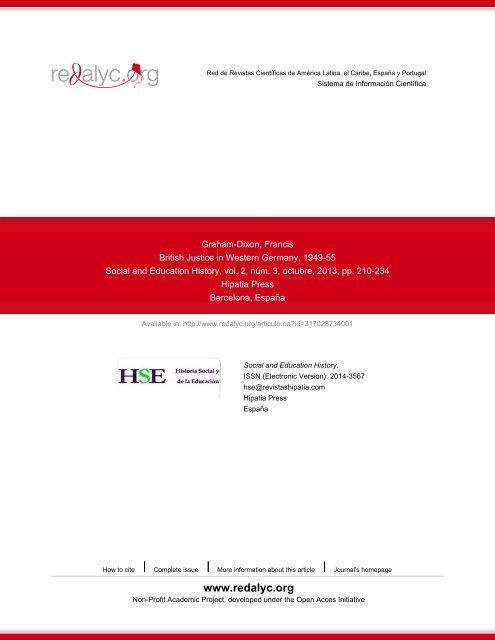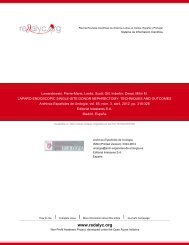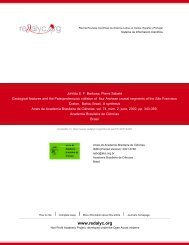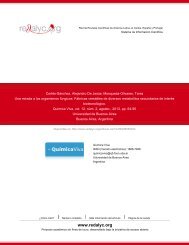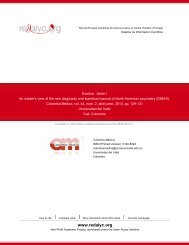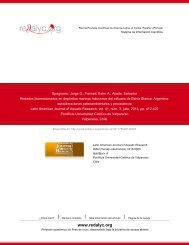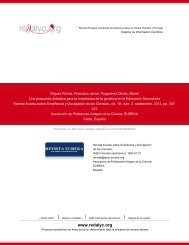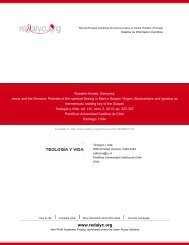Redalyc.British Justice in Western Germany, 1949-55
Redalyc.British Justice in Western Germany, 1949-55
Redalyc.British Justice in Western Germany, 1949-55
Create successful ePaper yourself
Turn your PDF publications into a flip-book with our unique Google optimized e-Paper software.
Red de Revistas Científicas de América Lat<strong>in</strong>a, el Caribe, España y Portugal<br />
Sistema de Información Científica<br />
Graham-Dixon, Francis<br />
<strong>British</strong> <strong>Justice</strong> <strong>in</strong> <strong>Western</strong> <strong>Germany</strong>, <strong>1949</strong>-<strong>55</strong><br />
Social and Education History, vol. 2, núm. 3, octubre, 2013, pp. 210-234<br />
Hipatia Press<br />
Barcelona, España<br />
Available <strong>in</strong>: http://www.redalyc.org/articulo.oa?id=317028734001<br />
Social and Education History,<br />
ISSN (Electronic Version): 2014-3567<br />
hse@revistashipatia.com<br />
Hipatia Press<br />
España<br />
How to cite Complete issue More <strong>in</strong>formation about this article Journal's homepage<br />
www.redalyc.org<br />
Non-Profit Academic Project, developed under the Open Acces Initiative
Instructions for authors, subscriptions and further details:<br />
http://hse.hipatiapress.com<br />
<strong>British</strong> <strong>Justice</strong> <strong>in</strong> <strong>Western</strong> <strong>Germany</strong>, <strong>1949</strong>-<strong>55</strong><br />
Francis Graham-Dixon 1<br />
1) DPhil <strong>in</strong> History from the University of Sussex. UK<br />
Date of publication: October 23 rd , 2013<br />
Edition period: October 2013-February 2014<br />
To cite this article: Graham-Dixon, F. (2013). <strong>British</strong> <strong>Justice</strong> <strong>in</strong> <strong>Western</strong><br />
<strong>Germany</strong>, <strong>1949</strong>-<strong>55</strong>. Social and Education History, 2(3), 210-234.<br />
doi: 10.4471/hse.2013.14<br />
To l<strong>in</strong>k this article: http://dx.doi.org/10.4471/hse.2013.14<br />
PLEASE SCROLL DOWN FOR ARTICLE<br />
The terms and conditions of use are related to the Open Journal System and<br />
to Creative Commons Attribution License (CCAL).
HSE – Social and Education History Vol. 2 No. 3 October 2013 pp. 210-234<br />
<strong>British</strong> <strong>Justice</strong> <strong>in</strong> <strong>Western</strong><br />
<strong>Germany</strong>, <strong>1949</strong>-<strong>55</strong><br />
Francis Graham-Dixon<br />
DPhil <strong>in</strong> History from University of Sussex.<br />
Abstract<br />
Brita<strong>in</strong> did not release its f<strong>in</strong>al two prisoners from the prison it adm<strong>in</strong>istered <strong>in</strong> West<br />
<strong>Germany</strong> until July 1957, eight years after the formation of the Federal Republic and<br />
the formal end<strong>in</strong>g of its military rule. By <strong>1949</strong>, <strong>Germany</strong>, once the enemy of<br />
Europe, assumed greater strategic significance <strong>in</strong> the m<strong>in</strong>ds of western politicians<br />
seek<strong>in</strong>g its re<strong>in</strong>tegration with<strong>in</strong> a new European family of nations to forestall fears<br />
of Soviet hegemony, not least because it now wanted to re-arm West <strong>Germany</strong>. The<br />
cont<strong>in</strong>u<strong>in</strong>g <strong>in</strong>carceration of German war crim<strong>in</strong>als had become a lesser priority <strong>in</strong><br />
the battleground of Cold War ideologies. The Adenauer government pressurised<br />
Brita<strong>in</strong> to honour its pledge to review the sentences for the hundreds of deta<strong>in</strong>ees<br />
who rema<strong>in</strong>ed <strong>in</strong> custody follow<strong>in</strong>g the Nuremberg trials. Brita<strong>in</strong>’s moral mandate<br />
to govern <strong>Germany</strong> from 1945 was underp<strong>in</strong>ned by its claims to be export<strong>in</strong>g<br />
democratic liberal values but, as this article expla<strong>in</strong>s, was exposed <strong>in</strong> its illiberal<br />
handl<strong>in</strong>g of the war crim<strong>in</strong>als issue which ran counter to the new moves towards<br />
reconciliation.<br />
Keywords: West <strong>Germany</strong>, Brita<strong>in</strong>, war crim<strong>in</strong>als, justice, reconciliation<br />
2013 Hipatia Press<br />
ISSN: 2014-3567<br />
DOI: 10.4471/hse.2013.14
HSE – Social and Education History Vol. 2 No. 3 October 2013 pp. 210-234<br />
La Justicia Británica en<br />
Alemania Occidental, <strong>1949</strong>-<strong>55</strong><br />
Francis Graham-Dixon<br />
DPhil <strong>in</strong> History from University of Sussex.<br />
Resumen<br />
Gran Bretaña no liberó a sus dos últimos presos de la cárcel que adm<strong>in</strong>istraba en<br />
Alemania Occidental hasta julio de 1957, ocho años después de la formación de la<br />
República Federal y la f<strong>in</strong>alización formal de su gobierno militar. En <strong>1949</strong><br />
Alemania, el antaño enemigo de Europa, adquiere una gran importancia estratégica<br />
en la mente de los políticos occidentales que buscan su re<strong>in</strong>tegración dentro de una<br />
nueva familia europea de naciones para prevenir los temores de la hegemonía<br />
soviética, sobre todo porque ahora querían rearmar Alemania Occidental. El<br />
encarcelamiento cont<strong>in</strong>uado de los crim<strong>in</strong>ales de guerra alemanes se había<br />
convertido en una prioridad menor en el campo de batalla de las ideologías de la<br />
Guerra Fría. El gobierno de Adenauer, fue presionado por Gran Bretaña a cumplir su<br />
promesa de revisar las sentencias de los cientos de detenidos que permanecían en<br />
prisión tras los juicios de Nuremberg. El mandato moral de Gran Bretaña para<br />
gobernar Alemania desde 1945, se apoyó en sus pretensiones de exportar los valores<br />
liberales democráticos, pero, como en este artículo se explica, fue expuesto en su<br />
manejo de la guerra liberal crim<strong>in</strong>ales cuestión que va en contra de los nuevos<br />
avances hacia la reconciliación.<br />
Palabras clave: Alemania occidental, Gran Bretaña, crim<strong>in</strong>ales de guerra, justicia,<br />
reconciliación<br />
2013 Hipatia Press<br />
ISSN: 2014-3567<br />
DOI: 10.4471/hse.2013.14
212 Francis Graham-Dixon -<strong>British</strong> <strong>Justice</strong> <strong>in</strong> <strong>Western</strong> <strong>Germany</strong><br />
T<br />
he historiography on the <strong>Western</strong> Allies’ occupation of <strong>Germany</strong><br />
from 1945 focuses disproportionately on the first five years of<br />
reconstruction, material and humanitarian crises and Cold War<br />
division. Less attention is devoted to cont<strong>in</strong>uities <strong>in</strong> occupation policy dur<strong>in</strong>g<br />
the five years after <strong>1949</strong> and their consequential impact on the new West<br />
German state.<br />
Policy on <strong>in</strong>ternment, <strong>in</strong>carceration and detention illum<strong>in</strong>ates one of<br />
many fundamental problems fac<strong>in</strong>g the Federal Republic on its path from<br />
fascist to sovereign nation. This discussion evaluates whether Allied policy –<br />
and here the focus is Brita<strong>in</strong> – harmonised with political and social change <strong>in</strong><br />
<strong>Germany</strong> after <strong>1949</strong>. The approach is twofold: first, to expla<strong>in</strong> the chang<strong>in</strong>g<br />
political and social functions of its <strong>in</strong>ternment and detention policies, and<br />
second, to expla<strong>in</strong> the tensions between the <strong>British</strong> application of justice and<br />
the Germans’ own sense of fairness. How far did it reconcile punishment for<br />
crimes with reconciliation, and how was this affected by public op<strong>in</strong>ion?<br />
Grow<strong>in</strong>g controversy <strong>in</strong> Brita<strong>in</strong> and <strong>Germany</strong> over perceived failures to<br />
square these contradictions exacerbated difficult negotiations over<br />
rearmament and underm<strong>in</strong>ed Brita<strong>in</strong>’s justification for its punitive<br />
sentenc<strong>in</strong>g and detention policies, experienced by Germans at the time as a<br />
form of victor’s justice, and more recently conceptualised as “Nuremberg<br />
Syndrome” (Zolo, 2009, p. 47). 1 The policy became toxic for <strong>British</strong><br />
authorities <strong>in</strong> <strong>Germany</strong> and for its government as allegations of worsen<strong>in</strong>g<br />
conditions and prisoner mistreatment leaked publicly <strong>in</strong> newspaper<br />
<strong>in</strong>terviews, letters and photographs, not possible <strong>in</strong> the previously censored<br />
press.<br />
Brita<strong>in</strong>’s occupation policy <strong>in</strong> <strong>Germany</strong> from 1945-49 was conceived of<br />
and presented as its moral mandate (Graham-Dixon, 2010) with many still<br />
<strong>in</strong>terpret<strong>in</strong>g the birth of the Federal Republic as the occupation’s effective<br />
demise which drew a l<strong>in</strong>e <strong>in</strong> the sand under <strong>British</strong> rule. It did not.<br />
Narratives of recovery from 1945 pa<strong>in</strong> to mid-1950s prosperity underplay<br />
the difficult path to the Bonn Treaty <strong>in</strong> May 1952 and beyond with West<br />
<strong>Germany</strong> granted greater sovereignty albeit with many cont<strong>in</strong>u<strong>in</strong>g<br />
restrictions.<br />
Major issues rema<strong>in</strong>ed unresolved <strong>in</strong> September <strong>1949</strong> becom<strong>in</strong>g sources<br />
of fresh grievances – end<strong>in</strong>g the state of war, dismantl<strong>in</strong>g, demilitarisation<br />
and limits placed on <strong>in</strong>dustry, the bomb<strong>in</strong>g and occupation of Heligoland,<br />
requisition<strong>in</strong>g of private property, and policy on war crimes trials and
HSE – Social and Education History, 2(3) 213<br />
sentenc<strong>in</strong>g. This period is a story of how l<strong>in</strong>ger<strong>in</strong>g memories of <strong>Germany</strong>’s<br />
past coloured defensive <strong>British</strong> policies. When Brita<strong>in</strong>’s Control<br />
Commission left West <strong>Germany</strong> on May 11 19<strong>55</strong>, a lead<strong>in</strong>g broadsheet<br />
wrote: “The Germans are not likely to remember with gratitude the Allied<br />
Military Governments and Control Commissions…. Occupation<br />
Governments scarcely expect to be popular…. But today’s obituary notice of<br />
the <strong>British</strong> occupation will pass unnoticed”. 2 This verdict challenges a<br />
popular <strong>British</strong> myth of an unalloyed success story, or that its presence <strong>in</strong><br />
<strong>Germany</strong> was mostly reparative. I suggest rather that we see <strong>British</strong> rule as a<br />
form of militant liberalism. By <strong>1949</strong> Brita<strong>in</strong>’s need to heal the diplomatic<br />
fractures faced new imperatives to restore German sovereignty, revise the<br />
Occupation Statute with its many reserved powers, and <strong>in</strong>corporate it as a<br />
peaceful member of the European community, outl<strong>in</strong>ed <strong>in</strong> the Petersberg<br />
Agreement between the <strong>Western</strong> Allies and the Federal Republic <strong>in</strong><br />
November <strong>1949</strong>. 3<br />
Anthony Nicholls has shown how <strong>Germany</strong> and Brita<strong>in</strong> always appear to<br />
approach closeness but somehow never quite seem able to achieve it. 4 My<br />
argument is that Brita<strong>in</strong>’s policy spoke more of a reflex amongst politicians<br />
and civil servants to reta<strong>in</strong> status and power <strong>in</strong> <strong>Germany</strong> over issues that it<br />
was reluctant to rel<strong>in</strong>quish jurisdiction, although we know that foreign<br />
policy prioritised the Soviet threat, the relationship with the United States,<br />
Commonwealth trade and Empire over Europe (Nicholls, 2005).This<br />
reflected as much Brita<strong>in</strong>’s reluctance to face up to its dim<strong>in</strong>ish<strong>in</strong>g global<br />
power status as a determ<strong>in</strong>ation to protect West <strong>Germany</strong>’s democratic base<br />
from the threat to <strong>Western</strong> <strong>in</strong>terests of Soviet expansionism. Problems did<br />
not evaporate merely because a military government regime was replaced <strong>in</strong><br />
<strong>1949</strong> by a new High Commission. Superficially this structural shift between<br />
occupier and occupied suggested a new relaxation of policy. But many West<br />
Germans viewed this transition as less clear-cut. Headl<strong>in</strong>es like “Between<br />
War and Peace” captured the prevail<strong>in</strong>g mood. With new threats to global<br />
stability such as <strong>in</strong> Korea, a new dialogue was needed to heal old wounds to<br />
help West <strong>Germany</strong>’s growth as a secure, stable and prosperous society.<br />
Potsdam failed to draw a l<strong>in</strong>e under six years of conflict, freez<strong>in</strong>g prospects<br />
of a thaw <strong>in</strong> <strong>British</strong>-German relations. Debates over West German<br />
rearmament and its role <strong>in</strong> a European Defence Community re-exposed<br />
<strong>British</strong> fear and mistrust that conflicted with Bonn’s hopes for sovereign
214 Francis Graham-Dixon -<strong>British</strong> <strong>Justice</strong> <strong>in</strong> <strong>Western</strong> <strong>Germany</strong><br />
status with outstand<strong>in</strong>g issues, such as end<strong>in</strong>g German war crimes trials,<br />
settled <strong>in</strong> a peace treaty.<br />
The attenuated legal and political processes that delayed the Federal<br />
Republic’s sovereignty for so many years <strong>in</strong> many ways symbolised the<br />
problems cont<strong>in</strong>u<strong>in</strong>g to compromise Anglo-German relations after <strong>1949</strong>.<br />
Many residual tensions over rel<strong>in</strong>quish<strong>in</strong>g power and control were<br />
psychologically <strong>in</strong>gra<strong>in</strong>ed. This was highly relevant to the German war<br />
crim<strong>in</strong>als question.<br />
The <strong>Western</strong> Allies met on 4 th July 1950 to consider revis<strong>in</strong>g the <strong>1949</strong><br />
Occupation Statute and make recommendations for end<strong>in</strong>g the state of war<br />
with <strong>Germany</strong> to the Foreign M<strong>in</strong>isters’ September meet<strong>in</strong>g <strong>in</strong> New York,<br />
and to reach consensus on giv<strong>in</strong>g Bonn more control over its foreign<br />
relations. Greater sovereignty would profoundly alter its legal relationship<br />
with the occupy<strong>in</strong>g powers, necessitat<strong>in</strong>g the Statute’s revision. 5 Lawyers<br />
had to remove “<strong>in</strong>convenient anomalies” without “underm<strong>in</strong><strong>in</strong>g <strong>in</strong> any way<br />
the basis of the occupation and the Allies’ right to reta<strong>in</strong> necessary<br />
controls”. 6 Brita<strong>in</strong> dist<strong>in</strong>guished between the persistence of a state of war <strong>in</strong><br />
its domestic law and “the actual state” of relations with <strong>Germany</strong>. 7 France<br />
thought war should be considered ended on 8 May 1945 when the Nazi state<br />
surrendered unconditionally, therefore ceas<strong>in</strong>g to exist. “Will the state of<br />
war be ended?” asked one lead<strong>in</strong>g newspaper. 8 For a further year from July<br />
1950 many repeated this refra<strong>in</strong>. While the <strong>Western</strong> Allies sought unanimity<br />
German newspapers grew tired of symbolic “peace” declarations, refocus<strong>in</strong>g<br />
their fire on how laws effective from May 1945 were now “outdated” <strong>in</strong><br />
democratic politics with other issues unresolved such as rights legislation,<br />
frontiers and reparations. 9<br />
From West <strong>Germany</strong>’s perspective, a formal end to hostilities, sought<br />
s<strong>in</strong>ce September <strong>1949</strong>, 10 was psychologically more important than<br />
recognition of its Foreign M<strong>in</strong>istry, described as the “small revision” or<br />
“small step” of 6 March 1951 that permitted it to conduct a foreign policy. 11<br />
Accord<strong>in</strong>g to another more liberal newspaper, when Holland ended formal<br />
hostilities <strong>in</strong> May 1951 this showed that the Germans were no longer classed<br />
as the enemy. 12 Bonn recognised the significance of alter<strong>in</strong>g its relationship<br />
with the occupiers as a step to normalis<strong>in</strong>g political relationships, 13<br />
liberalis<strong>in</strong>g economic controls such as freedom to engage <strong>in</strong> a profession, 14<br />
or lift<strong>in</strong>g property controls. However, the <strong>British</strong> government reserved “a<br />
great many rights over former enemy property” that only a fully-ratified
HSE – Social and Education History, 2(3) 215<br />
peace treaty could resc<strong>in</strong>d. 15 It was little surprise that Foreign Secretary<br />
Herbert Morrison after see<strong>in</strong>g Adenauer <strong>in</strong> Bonn glossed over these details<br />
as a “friendly understand<strong>in</strong>g”. The German press, however, expected no<br />
mean<strong>in</strong>gful outcome from such visits. Their conclusion was realistic for<br />
Morrison’s real <strong>in</strong>terest was to f<strong>in</strong>d a basis for greater equality “as an<br />
important and active partner <strong>in</strong> Europe” 16 , diplomatic code for seek<strong>in</strong>g West<br />
<strong>Germany</strong>’s contribution of armed forces to a collective defence system. This<br />
was problematic given a precarious economy with manufactur<strong>in</strong>g and<br />
trad<strong>in</strong>g restrictions <strong>in</strong> force, the ambivalent views of <strong>British</strong> politicians 17 and<br />
church leaders re<strong>in</strong>forced by SPD and Evangelical Church 18 fears of<br />
renascent militarism.<br />
Significantly, Morrison was also silent on possible sentence revisions for<br />
war crim<strong>in</strong>als, Accord<strong>in</strong>g to <strong>in</strong>formation relayed to the Foreign M<strong>in</strong>istry<br />
from a prom<strong>in</strong>ent Hamburg lawyer just before the Bonn meet<strong>in</strong>g with<br />
Adenauer, the <strong>British</strong> government’s view was that revision was “a welcome<br />
way out of the embarrass<strong>in</strong>g position <strong>in</strong> which they would f<strong>in</strong>d themselves if<br />
the Adenauer government took charge over the completion of custodial<br />
sentences”. In his view, if Brita<strong>in</strong> decided on sentence reductions as the<br />
Americans already had done, this would precipitate the resolution of most<br />
cases by the end of 1951. Moreover, agree<strong>in</strong>g to “the possibility of a<br />
compromise would not cost the English any prestige”. 19<br />
Alongside <strong>British</strong> ambivalence over rearmament was its lukewarm<br />
commitment to Europe. Morrison’s predecessor Ernest Bev<strong>in</strong>, never<br />
<strong>Germany</strong>’s biggest cheerleader, did not respond positively to Churchill’s<br />
demand that West <strong>Germany</strong> be admitted to the Council of Europe, and<br />
rejected <strong>British</strong> participation <strong>in</strong> the Schuman Plan to <strong>in</strong>tegrate its coal and<br />
steel resources, re<strong>in</strong>forc<strong>in</strong>g Konrad Adenauer’s antipathy towards the<br />
Labour government. This expla<strong>in</strong>s tepid press reaction that end<strong>in</strong>g its enemy<br />
status did not deliver the far bigger prize of a peace treaty. 20 Although on 9<br />
July 1951 the <strong>Western</strong> Allies among 50 states declared war “over <strong>in</strong><br />
practice” <strong>in</strong> a juridical sense, full peace terms were not on the table. 21 Some<br />
re-emphasised the psychological boost “s<strong>in</strong>ce yesterday the <strong>British</strong><br />
occupation soldiers no longer see us as enemies…” 22 Others, such as Vice-<br />
Chancellor Franz Blücher, sensed the moment was ripe to revisit a<br />
contentious issue on which this declaration was conspicuously silent - an<br />
amnesty for certa<strong>in</strong> German war crim<strong>in</strong>als <strong>in</strong> <strong>British</strong>-adm<strong>in</strong>istered gaols. 23<br />
This po<strong>in</strong>ted to a cont<strong>in</strong>uation of Brita<strong>in</strong>’s cautiously pragmatic policy, and
216 Francis Graham-Dixon -<strong>British</strong> <strong>Justice</strong> <strong>in</strong> <strong>Western</strong> <strong>Germany</strong><br />
forestalled decisive action over review<strong>in</strong>g the judgements aga<strong>in</strong>st German<br />
military personnel imprisoned for war crimes.<br />
Politicis<strong>in</strong>g justice<br />
Arriv<strong>in</strong>g <strong>in</strong> Bonn <strong>in</strong> 1950, Brita<strong>in</strong>’s new High Commissioner, Sir Ivone<br />
Kirkpatrick, <strong>in</strong> a post that for many Germans symbolised the end of<br />
occupation by an <strong>in</strong>creas<strong>in</strong>gly resented military government, said that his<br />
two foremost aims were to br<strong>in</strong>g <strong>Germany</strong> <strong>in</strong>to the comity of nations as soon<br />
as possible, and “to elim<strong>in</strong>ate all causes of Anglo-German friction” whilst<br />
defend<strong>in</strong>g <strong>British</strong> legitimate <strong>in</strong>terests (Kirkpatrick, 1959, p. 220). High<br />
among his priorities were the cont<strong>in</strong>u<strong>in</strong>g war crimes trials five years after the<br />
end of hostilities. What Kirkpatrick did not mention was the grow<strong>in</strong>g<br />
disquiet <strong>in</strong> <strong>Germany</strong>, and later <strong>in</strong> Brita<strong>in</strong>, over the prolonged <strong>in</strong>carceration of<br />
German nationals <strong>in</strong> the military prison adm<strong>in</strong>istered by Brita<strong>in</strong> at Werl, east<br />
of Dortmund. Little attention has focused on how the judgements aga<strong>in</strong>st<br />
many less high-profile prisoners and delays <strong>in</strong> the sentence review process<br />
contradicted <strong>British</strong> liberal democratic values, a reputation tarnished from<br />
German perspectives, for example, by <strong>in</strong>transigence over dismantl<strong>in</strong>g of<br />
much of its <strong>in</strong>dustrial <strong>in</strong>frastructure and abdicat<strong>in</strong>g responsibility for the<br />
refugee and expellee issue.<br />
The policy on the treatment of deta<strong>in</strong>ees re-exposes this shadow side to<br />
<strong>British</strong> claims of even-handed justice and fairness <strong>in</strong> the treatment of<br />
German <strong>in</strong>ternees. Many of the orig<strong>in</strong>al judgements were challenged by the<br />
new German government as evidence emerged of clear breaches of due<br />
process. Follow<strong>in</strong>g his summer 1950 announcement of comprehensive<br />
sentence reviews for Germans <strong>in</strong>dicted for war crimes, and respond<strong>in</strong>g to<br />
calls for a full amnesty sought by German authorities, the High<br />
Commissioner prevaricated over implementation, concerned more with<br />
protect<strong>in</strong>g <strong>British</strong> legitimate <strong>in</strong>terests. Meanwhile the Germans demanded<br />
the immediate release of prisoners who objectively could no longer be<br />
considered a threat to <strong>British</strong> <strong>in</strong>terests due to age, <strong>in</strong>firmity or a comb<strong>in</strong>ation<br />
of the two. Further tensions surfaced as delays <strong>in</strong> implement<strong>in</strong>g policy<br />
conflicted with the West’s goal of re<strong>in</strong>tegrat<strong>in</strong>g western <strong>Germany</strong> as an<br />
equal European partner. Brita<strong>in</strong> was slower to release prisoners than its<br />
<strong>Western</strong> Allies. <strong>Germany</strong>’s new Foreign and <strong>Justice</strong> M<strong>in</strong>istries enlisted the<br />
Evangelical Lutheran and Catholic Churches to make an official approach to
HSE – Social and Education History, 2(3) 217<br />
W<strong>in</strong>ston Churchill, returned to office <strong>in</strong> 1951, for a full pardon for those<br />
rema<strong>in</strong><strong>in</strong>g <strong>in</strong> custody. The new Prime M<strong>in</strong>ister wanted a “dignified and<br />
satisfactory solution” to this long-stand<strong>in</strong>g grievance, but honour had to be<br />
satisfied on both sides. Certa<strong>in</strong>ly Brita<strong>in</strong> could not be seen to lose face on the<br />
world stage. Ma<strong>in</strong>ta<strong>in</strong><strong>in</strong>g honour and “prestige” had long been a hallmark of<br />
<strong>British</strong> rule.<br />
Influential <strong>British</strong> legislators such as Hartley Shawcross, Brita<strong>in</strong>’s Chief<br />
Prosecutor at Nuremberg and former Labour’s Attorney-General later<br />
claimed Communists and opponents of <strong>British</strong> rearmament were exploit<strong>in</strong>g<br />
this issue for their own ends. There was an <strong>in</strong>herent tension between review<br />
opponents such as Shawcross who was determ<strong>in</strong>ed to protect the credibility<br />
of the orig<strong>in</strong>al verdicts, and other well-qualified observers such as Basil<br />
Liddell Hart whose moral perspective was more <strong>in</strong> tune with Realpolitik ,<br />
namely Brita<strong>in</strong>’s need to re-th<strong>in</strong>k policy on this issue: “For our good name<br />
and <strong>in</strong>fluence for good, it is essential that we should clearly show that we are<br />
striv<strong>in</strong>g to be just, not v<strong>in</strong>dictive”. 24 A transparent, swift sentence review<br />
process would have enabled Brita<strong>in</strong> to make good its pledges and ma<strong>in</strong>ta<strong>in</strong><br />
global prestige. The opposite occurred. This is odd as historians generally<br />
accept the <strong>Western</strong> Allies and Soviets were more <strong>in</strong>terested <strong>in</strong> prosecut<strong>in</strong>g<br />
crimes aga<strong>in</strong>st their own military than crimes aga<strong>in</strong>st humanity (Heberer &<br />
Matthäus, 2008) yet many still <strong>in</strong> <strong>British</strong> custody were <strong>in</strong>dicted from 1947<br />
for crimes aga<strong>in</strong>st humanity. Kirkpatrick’s announcement of comprehensive<br />
sentence reviews prompted susta<strong>in</strong>ed press speculation until 1954 of an<br />
amnesty 25 for <strong>in</strong>ternees. Some rema<strong>in</strong>ed under sentence of death which<br />
public op<strong>in</strong>ion could not accept as the Basic Law abolished capital<br />
punishment <strong>in</strong> German courts. 26<br />
Proceed<strong>in</strong>gs aga<strong>in</strong>st less high-profile prisoners, such as military<br />
chauffeurs <strong>in</strong>dicted for conspiracy, called <strong>in</strong>to doubt the reliability of<br />
judgements. Evangelical Church documents on the planned reviews cite<br />
breaches of due process by <strong>British</strong> military courts with defendants given at<br />
most a few days, sometimes only hours to prepare their written trial defence.<br />
All charges were <strong>in</strong> English with no German translation for the accused,<br />
with trials conducted <strong>in</strong> English and no written or verbal reasons given for<br />
judgements. Moreover <strong>in</strong> April 1951 it was announced that arrest without<br />
legal warrant, and <strong>in</strong>ternment without trial <strong>in</strong> a “secret prison” of those<br />
suspected of espionage “or other activity directed aga<strong>in</strong>st the <strong>British</strong> forces<br />
of occupation” would cont<strong>in</strong>ue. 27 By 1952 many had not received a written
218 Francis Graham-Dixon -<strong>British</strong> <strong>Justice</strong> <strong>in</strong> <strong>Western</strong> <strong>Germany</strong><br />
summary of their judgements. 28 Deny<strong>in</strong>g <strong>in</strong>ternees rights of Habeas Corpus<br />
us<strong>in</strong>g security exigencies to deta<strong>in</strong> suspects without charge <strong>in</strong> Brita<strong>in</strong> and the<br />
United States over 60 years later on the pretext of extremist views or<br />
terrorism has a prescient antecedent.<br />
The Evangelical Church (EKD), represented by Mart<strong>in</strong> Niemöller, was<br />
worried about “rights abuses” aga<strong>in</strong>st prisoners. Their Foreign Department<br />
proposed writ<strong>in</strong>g to the Bishop of Sheffield stress<strong>in</strong>g such abuses 29 <strong>in</strong> liaison<br />
with the <strong>Justice</strong> M<strong>in</strong>istry’s early 1952 <strong>in</strong>itiative to approach Churchill<br />
directly. Niemöller alerted a receptive <strong>British</strong> Council of Churches to the<br />
problems <strong>in</strong> December 1950. 30 N<strong>in</strong>e months earlier an International Red<br />
Cross paper accentuated prisoner’s rights under the 1929 Geneva<br />
Convention. The <strong>Justice</strong> M<strong>in</strong>istry was keen for allegations not to be traced to<br />
its document “so as not to lose the <strong>in</strong>itiative <strong>in</strong> these matters.” 31 With<br />
denazification not produc<strong>in</strong>g any substantive sentence reviews by 1952,<br />
clergymen like Hannover’s Landesbischof Lilje hoped to dovetail these<br />
concerns with Allied talks on the Occupation Statute and <strong>Germany</strong>’s role <strong>in</strong><br />
<strong>Western</strong> Europe’s defence. 32<br />
Anticipat<strong>in</strong>g the gravity of the rearmament issue <strong>in</strong> spr<strong>in</strong>g 1950,<br />
Adenauer unambiguously articulated two pre-conditions for talks, “cessation<br />
of the defamation of the German soldier and a satisfactory settlement of<br />
sentences for war crimes”. However it took over n<strong>in</strong>e months to beg<strong>in</strong> the<br />
sentence reviews. The High Commissioner’s delay <strong>in</strong> implementation was<br />
well timed as NATO foreign m<strong>in</strong>isters were due to agree proposals <strong>in</strong><br />
December on <strong>Germany</strong>’s f<strong>in</strong>ancial contribution to defence (Bloxham, 2001,<br />
p. 167). Kirkpatrick <strong>in</strong>formed Adenauer <strong>in</strong> November that 240 German<br />
nationals were held <strong>in</strong> Werl with around 160 sentenced for murder or<br />
maltreatment of Allied nationals and POWs <strong>in</strong> concentration camps. 33 He<br />
claimed all cases were re-exam<strong>in</strong>ed the previous year, 66 result<strong>in</strong>g <strong>in</strong><br />
reduced sentences and 28 <strong>in</strong> release. 34 Promis<strong>in</strong>g another “comprehensive<br />
review” 35 dur<strong>in</strong>g 1951 his pledge significantly precluded review<strong>in</strong>g any of<br />
the actual judgements. Perversely, the January <strong>1949</strong> first review was<br />
considered “f<strong>in</strong>al…no further reviews except under exceptional<br />
circumstances” (Bloxham, 2001). One year later Brita<strong>in</strong> agreed to an<br />
amnesty for those aged over 65 and unfit for imprisonment, and to <strong>in</strong>troduce<br />
a parole system. 36 But this concession was on <strong>Germany</strong> <strong>in</strong>itiatives.<br />
The <strong>Justice</strong> M<strong>in</strong>istry wanted Brita<strong>in</strong> to adopt an “<strong>in</strong>tegrated and active”<br />
amnesty policy <strong>in</strong> l<strong>in</strong>e with the other <strong>Western</strong> powers. It sought legal
HSE – Social and Education History, 2(3) 219<br />
dist<strong>in</strong>ction between those cleared by denazification and other crim<strong>in</strong>als <strong>in</strong><br />
custody, and a new committee to exam<strong>in</strong>e rights of public officials not<br />
convicted of any crime and who without this clarification were guilty under<br />
new German law. 37 The EKD Hilfswerk tried to <strong>in</strong>terpret the legal<br />
complexities of Allied Control Council Law No. 10 regard<strong>in</strong>g war crimes<br />
sentenc<strong>in</strong>g and members of crim<strong>in</strong>al organisations. It had to be well briefed<br />
on legal m<strong>in</strong>utiae if efforts to secure at least better prison conditions were to<br />
succeed. To be taken seriously by the <strong>British</strong> government needed more than<br />
polemics on a duty of care and Christian conscience <strong>in</strong>voked most notably <strong>in</strong><br />
Brita<strong>in</strong> by Victor Gollancz and George Bell.<br />
In September 1951, 37 Hamburg lawyers represent<strong>in</strong>g prisoners<br />
petitioned the <strong>Justice</strong> M<strong>in</strong>istry, aware that Bonn considered some <strong>in</strong>mates<br />
unjustly <strong>in</strong>dicted. Inter-departmental correspondence po<strong>in</strong>tedly labelled them<br />
as “German political prisoners <strong>in</strong> Werl” or “so-called German war<br />
crim<strong>in</strong>als”. 38 A lead<strong>in</strong>g lawyer lobbied Adenauer who replied that only<br />
“general issues” were discussed on his short London visit. 39 German<br />
newspaper headl<strong>in</strong>es, previously optimistic, shifted to critiques of <strong>British</strong><br />
obfuscation, delayed justice and failure to observe <strong>in</strong>ternees’ fundamental<br />
rights. 40 Wider scepticism over the verdicts and prison treatment was at the<br />
heart of anger at the decision to review only sentences. Stung by newspaper<br />
criticisms of a new, tougher prison regime with arbitrary limits recently<br />
imposed on Christmas parcels and prisoners tobacco 41 sure to <strong>in</strong>flame<br />
resentments, Kirkpatrick rebuked Adenauer:<br />
I have no doubt that you were unaware that such statements were<br />
be<strong>in</strong>g published on behalf of your Government and that <strong>in</strong> the light<br />
of your conversations <strong>in</strong> London with Mr. Churchill and Mr. Eden<br />
you will deprecate the public exchange of official recrim<strong>in</strong>ations on<br />
this delicate topic. Our purpose, as Mr. Churchill expla<strong>in</strong>ed to you,<br />
is to f<strong>in</strong>d a dignified and satisfactory solution. But our <strong>in</strong>tentions<br />
are likely to be frustrated if these polemics cont<strong>in</strong>ue…I am<br />
refra<strong>in</strong><strong>in</strong>g from any detailed reply to these statements, some of<br />
which I can prove to be <strong>in</strong>accurate, and I s<strong>in</strong>cerely hope that you<br />
will take steps to prevent any repetition. 42<br />
The German press jumped on this dress<strong>in</strong>g-down of the Chancellor:<br />
“Kirkpatrick protests aga<strong>in</strong>st anti-<strong>British</strong> propaganda.” 43 Just as relevant was
220 Francis Graham-Dixon -<strong>British</strong> <strong>Justice</strong> <strong>in</strong> <strong>Western</strong> <strong>Germany</strong><br />
how a private letter had been leaked <strong>in</strong>to the public doma<strong>in</strong>. Betray<strong>in</strong>g the<br />
High Commissioner’s discomfort at the politicisation of this issue only<br />
fuelled speculation among German politicians and the public already<br />
impatiently anticipat<strong>in</strong>g his sentence review announcement, and statements<br />
by the DP, 44 FDP, 45 and lead<strong>in</strong>g church figures. All regarded any review as a<br />
new standard of more even-handed justice. Württemberg’s Evangelical<br />
Bishop Theophil Wurm commented publicly on General von Manste<strong>in</strong>’s<br />
situation <strong>in</strong> summer 1950, then <strong>in</strong> June 1952 wrote an open letter to<br />
Churchill argu<strong>in</strong>g the “rema<strong>in</strong>s of the spirit of Nuremberg must now be put<br />
to rest”. 46 Six months earlier he was approached by the Association of<br />
Returnees, Prisoners of War and Relatives of Miss<strong>in</strong>g Persons (VdH) to do<br />
all he could to improve conditions <strong>in</strong> Werl. 47 Card<strong>in</strong>al Fr<strong>in</strong>gs met<br />
Kirkpatrick, a fellow Catholic, 48 <strong>in</strong> November 1950, 49 and as part of the<br />
<strong>Justice</strong> Department and Foreign M<strong>in</strong>istry’s campaign to use the churches to<br />
lobby Churchill for a pardon by Christmas 1951, was requested by the EKD<br />
to make correspond<strong>in</strong>g representations. 50 Bishop Dibelius of Berl<strong>in</strong><br />
rem<strong>in</strong>ded Churchill of Kirkpatrick’s announcement <strong>in</strong> January 1951 that<br />
there was no man <strong>in</strong> prison for war crimes whose sentence he “would not be<br />
prepared to review <strong>in</strong> view of the changed circumstances” with no decision<br />
yet reached on petition submissions by 210 German nationals. He wanted<br />
time served prior to sentenc<strong>in</strong>g to be <strong>in</strong>cluded as was the practice <strong>in</strong> 1947,<br />
and for Brita<strong>in</strong> to grant Christmas leave to seriously ill prisoners, the elderly<br />
and very young. <strong>British</strong> authorities <strong>in</strong>structed petitions must not <strong>in</strong>clude<br />
statements on the question of guilt. The Germans complied with this. 51<br />
Churchill’s desire for an equitable solution exposed deeper <strong>British</strong><br />
schisms. Kirkpatrick’s pledge to look at all cases caused serious ructions<br />
with<strong>in</strong> the Labour Cab<strong>in</strong>et. Shawcross, formerly its Attorney-General until<br />
April 1951, was perturbed that the “Communists and other opponents” of<br />
rearmament and critics of <strong>British</strong> proposals, <strong>in</strong> his view, were exploit<strong>in</strong>g talk<br />
of sentence reviews to accuse Brita<strong>in</strong> of “rearmament of the Nazis”. In<br />
October 1952, <strong>in</strong>tent on ensur<strong>in</strong>g the Nuremberg judgements were not<br />
compromised, he contentiously referred to any potential reviews as<br />
“appeasement”. 52 Attlee and Bev<strong>in</strong> quietly took Kirkpatrick to task for<br />
overreach<strong>in</strong>g his authority <strong>in</strong> adjudicat<strong>in</strong>g on appeals for clemency. 53 So not<br />
to reveal any policy split between Down<strong>in</strong>g Street and the High Commission<br />
this was presented as a “misunderstand<strong>in</strong>g” attributed to off-the-record<br />
comments at a press lunch – Kirkpatrick’s delegated powers were withdrawn
HSE – Social and Education History, 2(3) 221<br />
<strong>in</strong> June 1951. 54 With European defence negotiations <strong>in</strong> the balance, a new<br />
Conservative adm<strong>in</strong>istration needed to salvage embarrassment to <strong>British</strong><br />
prestige, enabl<strong>in</strong>g Anthony Eden to shift away from Bev<strong>in</strong>’s earlier hard-l<strong>in</strong>e<br />
stance. Equally irritat<strong>in</strong>g to politicians of both ma<strong>in</strong> <strong>British</strong> parties were<br />
attempts of Anglicans like Bell, Bishop of Chichester, to sway Labour <strong>in</strong>to<br />
abandon<strong>in</strong>g its policy.<br />
This is not a time, [and] nor are the <strong>British</strong> people a people to keep<br />
vanquished military leaders and their compatriots <strong>in</strong> cont<strong>in</strong>ued<br />
captivity. It is not the k<strong>in</strong>d of policy which our great soldiers and<br />
sailors, from the Duke of Well<strong>in</strong>gton onwards, would be likely to<br />
endorse…The cases of all war crim<strong>in</strong>als now <strong>in</strong> <strong>British</strong> custody are,<br />
we are told under steady review; but we can be too stiff and slow.<br />
Apart from the exceptional cases… the day has surely come for a<br />
general amnesty. <strong>55</strong><br />
Bell, among few consistent opponents of wartime area bomb<strong>in</strong>g, had<br />
argued for a less punitive occupation policy with public figures such as<br />
Gollancz, Labour MPs Richard Stokes and Frank Pakenham, former<br />
M<strong>in</strong>ister for <strong>Germany</strong> from 1947, later transferred by Attlee to the M<strong>in</strong>istry<br />
of Pensions, reward for his “rather too pro-German views”. Most conceded<br />
that guilty perpetrators of war crimes should be punished, but a reactionary<br />
mood <strong>in</strong> Brita<strong>in</strong> demand<strong>in</strong>g justice, even retribution, had moderated by<br />
1948. Moreover there were critics with<strong>in</strong> the <strong>British</strong> army. 56 That the<br />
orig<strong>in</strong>al tariffs of eleven Wehrmacht generals and higher-rank<strong>in</strong>g soldiers<br />
sentenced <strong>in</strong> May and June 1947 were reduced later suggests <strong>British</strong> military<br />
courts may have imposed unreasonably high sentences with reviews<br />
pragmatically motivated. Not all <strong>in</strong> government were happy about the<br />
revisions, rang<strong>in</strong>g from death sentences commuted to ten or 21 years <strong>in</strong><br />
former Field-Marshal Kesselr<strong>in</strong>g’s case, eighteen to twelve years for<br />
Manste<strong>in</strong>, or for others, from life to 21 or ten years. 57<br />
In January 1952, due to persistent damag<strong>in</strong>g headl<strong>in</strong>es, the <strong>Justice</strong><br />
M<strong>in</strong>istry visited the Werl prisoners to <strong>in</strong>spect conditions. They advised the<br />
Foreign M<strong>in</strong>istry that due to blanket press coverage of its penal system, it<br />
may be wise “to let matters rest for the moment” 58 given ongo<strong>in</strong>g<br />
negotiations over the Statute and rearmament. This diplomatically stopped<br />
shy of overtly criticis<strong>in</strong>g <strong>British</strong> policy without dismiss<strong>in</strong>g the charges of
222 Francis Graham-Dixon -<strong>British</strong> <strong>Justice</strong> <strong>in</strong> <strong>Western</strong> <strong>Germany</strong><br />
mistreatment fuelled by leaked <strong>in</strong>terviews, letters and photographs that<br />
evaded prison censorship. The allegations ga<strong>in</strong>ed credibility after EKD<br />
Synod President Wilm of Westphalia’s visit, result<strong>in</strong>g <strong>in</strong> denials by the High<br />
Commission’s Legal Adviser, economical <strong>in</strong> their disclosure as they were<br />
dis<strong>in</strong>genuous. Attempts to discredit Wilm emboldened his response to<br />
Kirkpatrick. Yes, he had been allowed access to <strong>in</strong>dividual prisoners <strong>in</strong> a<br />
separate room should they request an audience. But it was not mentioned<br />
that any such meet<strong>in</strong>gs had to be <strong>in</strong> a <strong>British</strong> official’s presence, and so it<br />
was unsurpris<strong>in</strong>g that <strong>in</strong>ternees were reluctant to unburden themselves. That<br />
none accepted the offer of a “human and Christian conversation” was<br />
designed to <strong>in</strong>fer prisoner contentment with their treatment and conditions <strong>in</strong><br />
captivity more generally. But to Wilm’s knowledge the German authorities<br />
still had no sentenc<strong>in</strong>g documents and state lawyers rema<strong>in</strong>ed unaware of the<br />
specific crimes for which they were held. What “shook” him most was the<br />
<strong>British</strong> refusal to take a senior clergyman’s word. 59 As I said, prestige or<br />
sav<strong>in</strong>g face was central to Brita<strong>in</strong>’s image, which is why they closed ranks.<br />
Kesselr<strong>in</strong>g sought Adenauer’s approval for a committee of <strong>British</strong> MPs<br />
visit Werl “to acqua<strong>in</strong>t themselves with the circumstances relat<strong>in</strong>g to war<br />
crim<strong>in</strong>als,” believ<strong>in</strong>g they and the <strong>British</strong> public were <strong>in</strong>sufficiently<br />
<strong>in</strong>formed of the full facts over the trials. The Foreign Office blocked his<br />
letter say<strong>in</strong>g they could not transfer their responsibility for war crim<strong>in</strong>als to<br />
Bonn and wanted to spare the Chancellor any embarrassment. 60 Whitehall<br />
was concerned not to re-ignite adverse public op<strong>in</strong>ion <strong>in</strong> both countries as<br />
debates on Manste<strong>in</strong>’s age and ill-health had started <strong>in</strong> 1948 a year before<br />
his trial. By September 1952, 116 lower-profile prisoners still awaited the<br />
f<strong>in</strong>d<strong>in</strong>gs of their reviews 61 although Kirkpatrick knew West <strong>Germany</strong>’s<br />
<strong>in</strong>clusion as a signatory to the European Defence Community Treaty was<br />
essential to mollify op<strong>in</strong>ion, and pressure was now on Eden “to f<strong>in</strong>ish with<br />
the war crim<strong>in</strong>als issue for good.” A pretext was found to release the two<br />
most prom<strong>in</strong>ent prisoners by arrang<strong>in</strong>g negative medical assessments for<br />
Manste<strong>in</strong> with a documented history of eye trouble, and Kesselr<strong>in</strong>g to be<br />
granted medical parole <strong>in</strong> order to undergo an exploratory operation for<br />
cancer (Bloxham, 2001). 62<br />
Hopes that Brita<strong>in</strong> might profit from its magnanimity were dashed by the<br />
new prison governor, Colonel H.S. Meech, follow<strong>in</strong>g the escape of a former<br />
Luftwaffe sergeant and former Wehrmacht private. 63 Meech was Chief<br />
Magistrate at the Control Commission summary courts <strong>in</strong> North Rh<strong>in</strong>e-
HSE – Social and Education History, 2(3) 223<br />
Westphalia 64 from 1945 to <strong>1949</strong> then appo<strong>in</strong>ted as Governor of the Allied<br />
military prison at Spandau before mov<strong>in</strong>g to Werl <strong>in</strong> April 1953. 65 In<br />
response to the German police’s “lack of cooperation” 66 , a failure to hunt<br />
down and turn <strong>in</strong> the German escapees, Meech withdrew all prisoners”<br />
privileges and compassionate leave for long-term <strong>in</strong>mates. Such a united<br />
display of German defiance and the disproportionate response it elicited to<br />
what was construed as collaboration suggested that Brita<strong>in</strong>’s policy was not<br />
as reconciliatory as claimed, highlighted <strong>in</strong> an amnesty petition with over<br />
500,000 signatures from six German Länder. 67<br />
Nearly n<strong>in</strong>e months later, some 100 <strong>in</strong>carcerated Germans awaited news.<br />
225 had been released s<strong>in</strong>ce 1947. 68 The German press noted that a further<br />
six months had elapsed s<strong>in</strong>ce ratification of the European Defence<br />
Community Treaty <strong>in</strong> May 1953 and a year s<strong>in</strong>ce its sign<strong>in</strong>g <strong>in</strong> Bonn without<br />
any necessary revisions to clear the path for a general amnesty of prisoners<br />
held by the <strong>Western</strong> Allies. 69 Late 1953 saw many reports of a series of<br />
<strong>in</strong>cidents with clear evidence of a new tighten<strong>in</strong>g of punishment measures 70<br />
and deterioration <strong>in</strong> prison conditions, alleged to have co<strong>in</strong>cided with<br />
Meech’s arrival. The Foreign M<strong>in</strong>istry’s measured reaction, contradicted by<br />
some as no change <strong>in</strong> prison policy, was that any change <strong>in</strong> prison governor<br />
had always provoked <strong>in</strong>ternees” discontent. 71 However, pressure was<br />
grow<strong>in</strong>g on the <strong>British</strong> to expedite the amnesty commissions scheduled to<br />
start 1 October 1953, all the more politically compell<strong>in</strong>g s<strong>in</strong>ce the Soviets<br />
six months after Stal<strong>in</strong>’s death had already released a large number of<br />
German war crim<strong>in</strong>als. 72 Tensions grew as it emerged that two prisoners<br />
recently had made suicide attempts, one, a 63-year old with a serious heart<br />
condition, on two separate occasions. 73<br />
Brita<strong>in</strong>’s propaganda counter-offensive swung <strong>in</strong>to action. The chief of<br />
the <strong>British</strong> Press, R.W. Crawshaw, set the defensive tone. The Fortschritt<br />
report, he claimed, did not correspond to facts as the prison doctor had<br />
expla<strong>in</strong>ed that only one tried to take his own life and neither attempt was<br />
serious. He l<strong>in</strong>ked the “alleged” stricter regime to the earlier two escapes,<br />
claim<strong>in</strong>g that new measures – such as reduction <strong>in</strong> prison leave on a<br />
prisoner’s word with such leave only permitted <strong>in</strong> urgent cases and under<br />
armed guard – were with<strong>in</strong> normal prison rules. 74 Despite repr<strong>in</strong>t<strong>in</strong>g <strong>British</strong><br />
objections to the “slanderous campaign” <strong>in</strong> certa<strong>in</strong> German newspapers and<br />
periodicals aga<strong>in</strong>st the <strong>British</strong> adm<strong>in</strong>istration, 75 Brita<strong>in</strong>’s credibility was<br />
ta<strong>in</strong>ted by a new revelation, an admission by the new High Commissioner,
224 Francis Graham-Dixon -<strong>British</strong> <strong>Justice</strong> <strong>in</strong> <strong>Western</strong> <strong>Germany</strong><br />
Sir Frederick Hoyer Millar that the High Commission refused to sanction a<br />
prison visit by the Vice President of the German Red Cross. 76 Others<br />
ma<strong>in</strong>ta<strong>in</strong>ed that rebuttal of German newspaper allegations was no accident.<br />
Accord<strong>in</strong>g to an unnamed <strong>British</strong> High Commission spokesman “this<br />
campaign of lies” co<strong>in</strong>cided with the scheduled start to the Anglo-German<br />
amnesty committee’s work. He conceded that rules were stricter for the past<br />
year due to the two escapes 77 prompt<strong>in</strong>g further questions whether a new<br />
discipl<strong>in</strong>ary regime signalled the end for any f<strong>in</strong>al amnesty. 78<br />
Adenauer visited Werl soon after Meech’s arrival and <strong>in</strong>troduction of the<br />
new measures. Brita<strong>in</strong>’s new High Commissioner Sir Frederick Hoyer<br />
Millar meanwhile played up the advent of “a truly free” and reunited<br />
<strong>Germany</strong>. While his comments betrayed greater preoccupation with bigger<br />
political challenges, and lack of tact over this issue, they did little to<br />
dim<strong>in</strong>ish grow<strong>in</strong>g press grumbl<strong>in</strong>gs over the war crim<strong>in</strong>als question. Another<br />
headl<strong>in</strong>e reflected the febrile atmosphere: “Does he know about the<br />
conditions <strong>in</strong> Werl?” Nor <strong>in</strong> its view was it helpful <strong>in</strong> present circumstances<br />
to read Churchill’s unconv<strong>in</strong>c<strong>in</strong>g statement that <strong>Germany</strong>’s strong<br />
representation <strong>in</strong> a new European army placed them once more amongst the<br />
major world powers. 79<br />
A <strong>British</strong> Information Services Press Announcement, its irritation barelyconcealed,<br />
dismissed all allegations as “abusive articles”, chiefly on dubious<br />
grounds that no prisoner who had met Hoyer Millar had compla<strong>in</strong>ed. 80 The<br />
High Commissioner rema<strong>in</strong>ed “conv<strong>in</strong>ced” that Meech’s adm<strong>in</strong>istration was<br />
both “efficient and just”, occupied look<strong>in</strong>g at ways of improv<strong>in</strong>g prisoners’<br />
liv<strong>in</strong>g conditions. 81 He emphasised that of 80 rema<strong>in</strong><strong>in</strong>g prisoners, only ten<br />
were formerly <strong>in</strong> the Wehrmacht, for example the SS, who had “committed<br />
to their military duty”. The rema<strong>in</strong><strong>in</strong>g 70 were former concentration camp<br />
commandants and camp guards “who either through their personal brutality<br />
or other abhorrent offences had caused serious suffer<strong>in</strong>g and the death of<br />
hundreds of unfortunate people <strong>in</strong>clud<strong>in</strong>g children”. Despite these crimes the<br />
<strong>British</strong> authorities undertook to review sentences through the establishment<br />
of the German/<strong>British</strong> clemency committee. As to accusations aga<strong>in</strong>st<br />
Meech, they <strong>in</strong>sisted that at no time was the “mental, spiritual, welfare or<br />
legal care of the <strong>in</strong>mates impaired”. 82 The German press dissected these<br />
detailed counter claims – most contested the denials <strong>in</strong> the <strong>British</strong> Press<br />
Release, some deconstruct<strong>in</strong>g verbatim extracts. 83 For the moment it seemed<br />
the attempt to discredit and quell the German campaign had succeeded.
HSE – Social and Education History, 2(3) 225<br />
Meanwhile Brita<strong>in</strong>’s broadsheet press dis<strong>in</strong>genuously claimed that the<br />
prisoner amnesty campaign was driven by one source. 84 In reality from<br />
September <strong>1949</strong> this <strong>in</strong>itiative had gathered momentum <strong>in</strong> <strong>Germany</strong> as a<br />
cross-party issue. Other right-w<strong>in</strong>g parties <strong>in</strong> opposition to the CDU, such as<br />
the DP and FDP, supported an amnesty and ma<strong>in</strong>ta<strong>in</strong><strong>in</strong>g the pressure to<br />
improve prison conditions as a matter of party prestige, and as a way to<br />
garner support <strong>in</strong> imm<strong>in</strong>ent September 1953 elections. 85 It is certa<strong>in</strong>ly true<br />
that the more right-w<strong>in</strong>g FDP, <strong>in</strong> particular, did not conceal its own<br />
agenda. 86 Moreover, this distorted the reality divert<strong>in</strong>g attention from<br />
grow<strong>in</strong>g adverse public op<strong>in</strong>ion over delays, <strong>in</strong> West <strong>Germany</strong> and Brita<strong>in</strong>.<br />
Support<strong>in</strong>g the High Commission response as a “Rebuff for Political<br />
Propagandists and Un<strong>in</strong>formed Critics”, the Manchester Guardian conceded:<br />
The press<strong>in</strong>g nature of the war crim<strong>in</strong>als problem <strong>in</strong> <strong>Western</strong><br />
<strong>Germany</strong>, and the fact that the campaign for their immediate release<br />
is grow<strong>in</strong>g daily, has <strong>in</strong>duced the <strong>British</strong> High Commission to make a<br />
statement of its case and to expla<strong>in</strong> that everyth<strong>in</strong>g possible is be<strong>in</strong>g<br />
done to secure a just solution... 87<br />
The “just solution” rhetoric was perverse given that the 1953 release of more<br />
high-profile prisoners such as Manste<strong>in</strong> and General Falkenhorst had been a<br />
transparent calculation by the <strong>Western</strong> Allies “to pander to the demands of<br />
nationalistic and militaristic elements <strong>in</strong> the Federal Republic, <strong>in</strong> an attempt<br />
to ga<strong>in</strong> their allegiance” on the rearmament issue (Bloxham, 2001, p. 171).<br />
It was only a matter of time before those who sought the truth <strong>in</strong> the face<br />
of <strong>British</strong> <strong>in</strong>sistence that their claims were politically orchestrated drew the<br />
obvious conclusion as to why prisoners had kept quiet. As we saw from the<br />
EKD Synod’s testimony, prisoners were <strong>in</strong>cl<strong>in</strong>ed to keep their own counsel<br />
as cell <strong>in</strong>terviews took place <strong>in</strong> the presence of a <strong>British</strong> official. With<br />
widespread report<strong>in</strong>g of the official <strong>British</strong> response to the 27 separate<br />
allegations, military sources who approached them were say<strong>in</strong>g it would be<br />
now most “unwise and foolhardy” for deta<strong>in</strong>ees to risk further “irritat<strong>in</strong>g”<br />
Meech on this topic. They concluded that Hoyer Millar’s op<strong>in</strong>ion was<br />
“contestable”, contradict<strong>in</strong>g his assertion that German penal regulations<br />
operated <strong>in</strong> all prisons <strong>in</strong> North Rh<strong>in</strong>e-Westphalia with German prisoners<br />
subject to Federal jurisdiction. Their evidence, although anecdotal, shows
226 Francis Graham-Dixon -<strong>British</strong> <strong>Justice</strong> <strong>in</strong> <strong>Western</strong> <strong>Germany</strong><br />
that war crim<strong>in</strong>als <strong>in</strong> practice were subjugated to the jurisdiction of the<br />
<strong>British</strong> penal code. 88<br />
Some amnesty supporters <strong>in</strong>terpreted the High Commissioner’s robust<br />
defend<strong>in</strong>g of <strong>British</strong> actions as the symbolic denial of an adm<strong>in</strong>istrator not<br />
“handicapped by the atmosphere of unhappy victors’ justice”. 89 Others<br />
ma<strong>in</strong>ta<strong>in</strong>ed that this leaked <strong>in</strong>formation was proof of a stricter captivity<br />
regime and “outbreaks of despair from some prisoners”, were emanat<strong>in</strong>g<br />
from sources “whose reliability was tried and tested”. In order to reach an<br />
impartial resolution to this propaganda stalemate and pass accurate<br />
<strong>in</strong>formation to the German public, it was proposed to establish a mixed<br />
German-English <strong>in</strong>vestigative commission led by a neutral power such as<br />
Sweden or Switzerland. 90<br />
Evidence of a tighten<strong>in</strong>g of custodial regulations was further corroborated<br />
<strong>in</strong> January 1954 <strong>in</strong> the statement by “H.G”, a recently released former<br />
prisoner. Prisoners of war were allowed to undertake paid work usually at<br />
the daily rate of 10-30 Pfennigs or 50 Pfennig for special duties. Without<br />
warn<strong>in</strong>g, those who had been work<strong>in</strong>g <strong>in</strong> the prison sometimes up to one<br />
year were removed from their duties without explanation. He also cited the<br />
withdrawal of a privilege granted to convicted war crim<strong>in</strong>als and Generals<br />
aged over 60 allow<strong>in</strong>g their cell doors to be open dur<strong>in</strong>g the day and<br />
between morn<strong>in</strong>g coffee and the start of the work<strong>in</strong>g day and dur<strong>in</strong>g their<br />
lunch. He named one guard, O’Neill, as “especially spiteful”. 91 Four months<br />
on, with the German-<strong>British</strong> amnesty commission now look<strong>in</strong>g <strong>in</strong>to the<br />
<strong>in</strong>dividual possibilities for releas<strong>in</strong>g prisoners, only five men and two<br />
women whose sentences had now expired, had been freed from the 80 still<br />
<strong>in</strong>carcerated. 92<br />
In May 1954 the High Commission announced that the war crim<strong>in</strong>als<br />
had been moved to a separate part of the prison. This was agreed at the Bonn<br />
conventions two years earlier. However <strong>in</strong> a masterpiece of understatement<br />
gloss<strong>in</strong>g over long-runn<strong>in</strong>g acrimony regard<strong>in</strong>g policy, it now conceded that<br />
new accommodation for the war crim<strong>in</strong>als was “markedly superior” to their<br />
former quarters, and significantly, that this made it possible to “<strong>in</strong>troduce<br />
some modifications <strong>in</strong> the day-to-day regulations, which the High<br />
Commission believes should help to improve the prisoners’ morale”. This<br />
was a very <strong>British</strong> way of agree<strong>in</strong>g to reform its regulations without<br />
admitt<strong>in</strong>g that German criticisms and allegations were justified. Furthermore<br />
the High Commission’s loud protestations of <strong>in</strong>nocence were called <strong>in</strong>to
HSE – Social and Education History, 2(3) 227<br />
doubt when it stated that to ensure that “a satisfactory penal standard is<br />
ma<strong>in</strong>ta<strong>in</strong>ed”, it had been decided <strong>in</strong> consultation with the Federal<br />
Government to <strong>in</strong>troduce annual <strong>in</strong>spections by the chairman of the prison<br />
commission <strong>in</strong> England and Wales accompanied by a senior official<br />
designated by the German government. Hoyer Millar also announced that he<br />
would appo<strong>in</strong>t an <strong>in</strong>dependent panel of three members entitled to visit Werl<br />
at any time and to <strong>in</strong>vestigate future problems. 93<br />
This announcement, implementation of the Bonn Treaty and the amnesty<br />
committee recommendations should have ended the controversy. For the<br />
next n<strong>in</strong>e months Werl did not make headl<strong>in</strong>es until February 19<strong>55</strong> when an<br />
open letter written by one current <strong>in</strong>ternee conta<strong>in</strong><strong>in</strong>g further accusations<br />
aga<strong>in</strong>st the prison governor was smuggled from the prison. It highlighted<br />
serial grievances, question<strong>in</strong>g why the cases of fifteen sergeants and<br />
lieutenants <strong>in</strong>carcerated s<strong>in</strong>ce 1946/7 without a day’s remission of their<br />
sentences, were less deserv<strong>in</strong>g of mercy than those of the former German<br />
Generals. Another cited an <strong>in</strong>cident follow<strong>in</strong>g the visit <strong>in</strong> October 1954 by a<br />
Commission of the International Red Cross. The next day, one prisoner who<br />
directed a request directly to the Commission was summoned from the work<br />
hall to his cell where he was ordered by Meech to undress <strong>in</strong> front of <strong>British</strong><br />
officials before be<strong>in</strong>g subjected to a body, cloth<strong>in</strong>g and cell search. No<br />
reasons were given. Any prisoner receiv<strong>in</strong>g a Christmas parcel exceed<strong>in</strong>g the<br />
10kg maximum weight was asked if they would donate the excess to<br />
prisoners who had not received parcels or if they would rather have them<br />
returned to their relatives. All opted for the latter. The letter’s author s<strong>in</strong>gled<br />
out Meech while stress<strong>in</strong>g that the rema<strong>in</strong><strong>in</strong>g <strong>British</strong> officials at Werl were<br />
outraged by Meech’s “methods’, and were “very correct’ <strong>in</strong> the execution of<br />
their office. 94 The anonymity of this source is redolent of a culture of<br />
pessimism and low morale which the authorities did little to alleviate, and<br />
only three months before the <strong>British</strong> took their leave of <strong>Germany</strong>. The last<br />
two prisoners were freed <strong>in</strong> July 1957, Werl closed 95 and an unedify<strong>in</strong>g<br />
rem<strong>in</strong>der of ten years of <strong>British</strong> rule faded <strong>in</strong>to historical obscurity.<br />
Conclusion<br />
All the evidence of the <strong>British</strong> regime’s conduct towards prisoners at Werl<br />
from <strong>1949</strong> po<strong>in</strong>ts to obfuscation and bureaucratic delays <strong>in</strong> the<br />
implementation of sentence reviews, caus<strong>in</strong>g added stress to the <strong>in</strong>mates, a
228 Francis Graham-Dixon -<strong>British</strong> <strong>Justice</strong> <strong>in</strong> <strong>Western</strong> <strong>Germany</strong><br />
systemic failure to address prisoners’ concerns about prison conditions either<br />
through robust denials of wrongdo<strong>in</strong>g, or by deflect<strong>in</strong>g responsibility for the<br />
grievances on to the Germans themselves whilst justify<strong>in</strong>g prison<br />
governance. Prisoner dissent was attributed to political opportunism by<br />
German right-w<strong>in</strong>g parties. By claim<strong>in</strong>g the higher moral ground, the High<br />
Commission had little difficulty <strong>in</strong> conv<strong>in</strong>c<strong>in</strong>g the <strong>British</strong> broadsheet press<br />
to close ranks beh<strong>in</strong>d a regime that never managed to shake off negative<br />
publicity.<br />
The more publicised and politicised the war crim<strong>in</strong>als issue became after<br />
1950, the more German perceptions hardened towards <strong>in</strong>justices <strong>in</strong> Brita<strong>in</strong>’s<br />
<strong>in</strong>ternment and detention policies, despite the eventual <strong>in</strong>stigation of<br />
sentence reviews, annual <strong>in</strong>spections and a neutral prison <strong>in</strong>vestigative<br />
panel.<br />
Elim<strong>in</strong>at<strong>in</strong>g all causes of Anglo-German friction “whilst resolutely<br />
defend<strong>in</strong>g our legitimate <strong>in</strong>terests”, as Kirkpatrick put it, was unsusta<strong>in</strong>able.<br />
In January 1952 he claimed there was no difference that had not been<br />
settled. 96 Germans saw it differently. The war crim<strong>in</strong>als issue dogged Brita<strong>in</strong><br />
until 19<strong>55</strong> as did the legacies of Heligoland, requisition<strong>in</strong>g, dismantl<strong>in</strong>g and<br />
the cartel policy. 97 Cont<strong>in</strong>u<strong>in</strong>g restrictions damaged <strong>in</strong>dustry due to the need<br />
to ref<strong>in</strong>ance dismantled and destroyed plant crucial to West German<br />
recovery, and imp<strong>in</strong>ged on citizens’ democratic rights. Although some say<br />
the ends justified the means, early <strong>British</strong> successes <strong>in</strong> transform<strong>in</strong>g<br />
<strong>Germany</strong>’s police, restor<strong>in</strong>g an <strong>in</strong>dependent judiciary, creat<strong>in</strong>g a responsible<br />
trade union movement (Annan, 1995, p. 158) and delegat<strong>in</strong>g parliamentary<br />
democracy were not capitalised upon.<br />
Brita<strong>in</strong>’s policy th<strong>in</strong>k<strong>in</strong>g <strong>in</strong> 1944 was to govern by “<strong>in</strong>direct rule”.<br />
Prolong<strong>in</strong>g its direct jurisdiction after <strong>1949</strong> compromised the democratic<br />
values it wanted to <strong>in</strong>culcate <strong>in</strong> Germans and fuelled fresh resentments,<br />
while cautious, sometimes illiberal policies and “the <strong>in</strong>flexibility of<br />
bureaucracy” (Kirkpatrick, 1959) 98 dampened German optimism. Efforts to<br />
w<strong>in</strong> hearts and m<strong>in</strong>ds were thwarted by the “elephant<strong>in</strong>e memories” 99 of<br />
Germans with experience of ten years of occupation. Moreover, s<strong>in</strong>ce the<br />
start of the Cold War Brita<strong>in</strong>’s foreign policy and economic priorities<br />
compromised its relations with Bonn, compounded by the primacy both<br />
attached to their respective relationships with America and <strong>Germany</strong>’s aim<br />
to secure equal status with France (Nicholls, 2005, pp. 26-27). After <strong>1949</strong>, as
HSE – Social and Education History, 2(3) 229<br />
these old grievances festered, Brita<strong>in</strong> struggled to reconcile itself to this<br />
vision of equality.<br />
The author gratefully acknowledges the Luftbrückendank Foundation, Berl<strong>in</strong>, for their<br />
generous support <strong>in</strong> fund<strong>in</strong>g this research.<br />
An abridged version of this article appears <strong>in</strong> Graham-Dixon, F. (2013). The Allied<br />
Occupation of <strong>Germany</strong> – The Refugee Crisis, Denazification and the Path to Reconstruction.<br />
London/New York: I.B.Tauris.<br />
Notes<br />
1 Zolo cites Cassese’s reference to “the persistence of a “Nuremberg Syndrome” where<br />
<strong>in</strong>ternational crim<strong>in</strong>al justice perpetuates the model of victors’ justice<br />
2 “<strong>British</strong> Take Their Leave of <strong>Germany</strong>”, Manchester Guardian, 11 May 19<strong>55</strong>.<br />
3 Hansard, House of Commons Foreign Affairs Debate, 28 March 1950, cols.215-16. The<br />
Agreement was signed on 22 November 1950.<br />
4 Nicholls, A. “Ups and downs <strong>in</strong> Anglo-German relations, <strong>1949</strong>-2008”, unpublished lecture,<br />
the Centre for <strong>British</strong> Studies, Humboldt University, Berl<strong>in</strong>, 28 May 2009.<br />
5 “West to sift issue on Bonn’s status’ New York Times, 3 July 1950; cf. “Zwischen<br />
Kriegszustand und Frieden”, Hamburger Freie Presse, 5 July 1950.<br />
6 “End<strong>in</strong>g state of war with <strong>Germany</strong>”, Manchester Guardian, 4 July 1950.<br />
7 “End of the War”, The Times, 10 July 1951.<br />
8 “Wird der Kriegszustand beendet?” Frankfurter Allgeme<strong>in</strong>e Zeitung [FAZ], 22 August<br />
1950.<br />
9 “Beendigung des Kriegszustandes”, Die Zeit, 5 October 1950.<br />
10 “Allies, Bonn to end state of war soon”, New York Times, 2 June 1951. This <strong>in</strong>cluded<br />
cancellation of <strong>Germany</strong>’s pre-1945 debts.<br />
11 Auswärtiges Amt [AA], Bd. 277, A1989, No. 13 “Deutsche Pressestimmen zur Revision<br />
des Besatzungstatuts” - “E<strong>in</strong> Schritt voran…”, Stuttgarter Zeitung, 7 March 1951; Wenn die<br />
“kle<strong>in</strong>e Revision genutzt wird”, FAZ, 7 March 1951; “E<strong>in</strong> kle<strong>in</strong>er Schritt”, Westfalenpost, 7<br />
March 1951.<br />
12 “Entfe<strong>in</strong>dung” von Deutschen”, Die Welt, 17 May 1951.<br />
13 “Vor dem Ende des Kriegszustandes’, FAZ, 9 July 1951.<br />
14 AA, Bd. 1344. A3304, <strong>Germany</strong> No.1, 19<strong>55</strong> – Documents relat<strong>in</strong>g to the Term<strong>in</strong>ation of<br />
the Occupation Regime <strong>in</strong> the Federal Republic of <strong>Germany</strong>, (1952, rev. 1954).<br />
“Gewerbefreiheit”, 26 May 1952 (p. 15). Bonn: HMSO; “Zwischen Krieg und Frieden”,<br />
Rhe<strong>in</strong>ische Post, 9 July 1951.<br />
15 “End of the War”, The Times, 10 July 1951.<br />
16 “Bald Ende des Kriegszustandes”, Mannheimer Morgen, 22 May 1951.<br />
17 AA, Bd. 942, A9157, “Security of <strong>Germany</strong>”, 9 August 1950. “The whole idea [of<br />
“rearm<strong>in</strong>g Germans”] is pa<strong>in</strong>ful not least to the <strong>British</strong> Government who has so<br />
conscientiously dismantled the capacity of the Ruhr to make weapons of war.”
230 Francis Graham-Dixon -<strong>British</strong> <strong>Justice</strong> <strong>in</strong> <strong>Western</strong> <strong>Germany</strong><br />
18<br />
For example, Evangelisches Zentralarchiv Berl<strong>in</strong> [EZAB], (ZA 5082/09), 81/1/1,<br />
Niemöller to Dibelius, 28 March 1951.<br />
19 AA, Bd. 2108, A6403, Leverkühn to von Trützschler, AA, 18 May 1951; Leverkühn to<br />
Kleiber, 18 May 1951. Leverkühn publicly criticised the rationale of Manste<strong>in</strong>’s trial as “a<br />
function of Jewish vengeance”, see Bloxham, D. (2001). Genocide on Trial – War Crimes<br />
Trials and the Formation of Holocaust History and Memory (p. 174). Oxford: Oxford<br />
University Press.<br />
20 For example, “Der Deutsche ist ke<strong>in</strong> Fe<strong>in</strong>d mehr”, Mannheimer Morgen, 27 July 1951.<br />
21 Ibid., “Zwischen Krieg und Frieden”, Rhe<strong>in</strong>ische Post, 9 July 1951; cf. ’46 Staaten beenden<br />
den Kriegszustand”, Die Welt, 10 July 1951.<br />
22 “Psychologisch beendet”, General-Anzeiger, 10 July 1951.<br />
23 “Adenauer bezeichnet die Beendigung des Kriegszustandes als Beg<strong>in</strong>n neuer Periode”, Die<br />
Neue Zeitung, 11 July 1951.<br />
24 “Letters to the Editor: The War Trials”, Manchester Guardian, 15 March 1951.<br />
25 “Gnadenloses Werl”, Der Fortschritt, 1 April 1954.<br />
26 AA, Bd. 1344 A3304, Documents Relat<strong>in</strong>g to the Term<strong>in</strong>ation of the Occupation Regime,<br />
“Jurisdiction, Crim<strong>in</strong>al Proceed<strong>in</strong>gs”, 26 May 1952. Capital punishment abolished 24 May<br />
<strong>1949</strong>.<br />
27 “Right of Habeas Corpus Denied”, Manchester Guardian, 9April 1951.<br />
28 EZAB, 2/2504, “Kriegsverbrecher”, (Ref. IV OKR Ranke, Bonn)-England (Bd.1).<br />
29 EZAB, 2/2506, (Bd. 3), Schwarzhaupt to Ranke, 1128/52, 15 February 1952 re: Werl<br />
prisoners.<br />
30 AA, Bd. 2087, A6310, “Schreiben an die Kirchen anderer Länder”, Der Rat, EKD, 6<br />
December 1950; “Das IRKK und der Beistand zugunsten der strafgerichtlich verfolgten<br />
Deutschen”, Hoffmann to AA, 21 March 1950.<br />
31<br />
EZAB, 2/2506, (Bd. 3), Ranke to Schwarzhaupt, B311.IV, Denkschrift des<br />
Bundesm<strong>in</strong>isteriums über Werl, 22 January 1952.<br />
32 EZAB, 2/2506, Lilje to Koch, 1 December 1951.<br />
33 “War Crim<strong>in</strong>als of Werl. <strong>British</strong> Statement: “Symbolic Gesture Unlikely”, The Times, 3<br />
December 1952. 938 war crim<strong>in</strong>als appeared before <strong>British</strong> courts. Of 219 death sentences<br />
160 were carried out, “War Crim<strong>in</strong>als of Werl”, The Times, 1 November 1952.<br />
34<br />
AA, Bd. 2087, A6309, “Aufstellung der <strong>in</strong> der westlichen Ländern wegen<br />
Kriegsverbrechen Angeklagten bzw. Verurteilten Deutschen”. Werl held 379 at 1 April 1950.<br />
America freed 91 from Landsberg, France 69 from Wittlich; cf. ibid., The Times, 3 December<br />
1952.<br />
35 AA, Bd. 2100, Mitteilung an die Presse’, 999/50, 23 November 1950.<br />
36 AA, Bd. 2108, A6403, <strong>British</strong> aide-mémoire, probably 1 January 1950.<br />
37 EZAB, 2/2506, Bd. 3, Ranke to Mens<strong>in</strong>g , 3 August 1951; on <strong>in</strong>terpretation of Law 10,<br />
Seelmann-Eggebert, Volkmann to Ranke, IV, 21 March 1951, 20 February 1951, 17 October<br />
1950; Ranke to Wurm, 2330/IV, 7 March 1950.<br />
38 AA, Bd. 2108, A6403, Zentrale Rechtsschutzstelle [ZR] to AA, “Kriegsverbrecher <strong>in</strong><br />
Werl”, 16 October 1951. Petition dated September 1951; see esp. ZR to AA, Abt. II,<br />
“Deutsche politische Häftl<strong>in</strong>ge <strong>in</strong> Werl”, 15 November 1951; Hoppe to ZR, “Gefangene <strong>in</strong><br />
Werl”, 28 December 1951.<br />
39 AA, Bd. 2108, A6404, Hawranke to Adenauer, 4 December 1951, Hoppe pp. Adenauer to<br />
Hawranke, 21 December 1951.<br />
40 “Bonn kritisiert britische Kriegsverbrecher-Prozesse”, Die Welt, 17 December 1951;
HSE – Social and Education History, 2(3) 231<br />
“Rechtsgrundsätze nicht beachtet”, FAZ, 15 December 1951.<br />
41 A five kilogram limit on Christmas food parcels and 150 grams pipe tobacco, 80 cigarettes<br />
or 30 cigars was <strong>in</strong>troduced December 1951, later raised to 10kg; tobacco restrictions<br />
rema<strong>in</strong>ed until 19<strong>55</strong>; overweight parcels were stamped “Annahme verweigert” and returned,<br />
Die Welt, 8 January 1953. The High Commission said parcels for prisoners <strong>in</strong> <strong>British</strong> custody<br />
would <strong>in</strong>crease to two, “Jetzt zwei Pakete jährlich”, Die Welt, 3 March 1954.<br />
42 AA, Bd. 2108, A6405, Diplomatische Korrespondenz, Nr. 216, Kirkpatrick to Adenauer,<br />
18 December 1951.<br />
43 “Kirkpatrick protestiert gegen antibritische Propaganda”, Die Neue Zeitung, 20 December<br />
1951.<br />
44 “Wiederaufnahmeverfahren für die Gefangenen von Werl”, Die Welt, 28 October 1950.<br />
The statement was by Bundesm<strong>in</strong>ister Hellwege.<br />
45 “FDP gegen Werler Haftpraxis”, Die Welt, 7 December 1951.<br />
46 “Bischof Wurm plädiert für Manste<strong>in</strong>”, Der Mittag, 19 August 1950; cf. “Bischof Wurm<br />
appelliert an Churchill”, Rhe<strong>in</strong>ische Post, 26 June 1952.<br />
47 EZAB, Bd. 3, Verband der Heimkehrer to Wurm, 17 December 1951. Der Verband der<br />
Heimkehrer, Kriegsgefangenen und Vermisstenangehörigen Deutschlands established <strong>in</strong><br />
1950.<br />
48 AA, Bd. 1262, A2927, “Personalien und Lebenslauf des neu ernannten Britischen Hohen<br />
Kommissars”<br />
49 “Fr<strong>in</strong>gs plädiert für Werl-Gefangene”, Die Welt, 18 November 1950.<br />
50 EZAB, 2/2505, Bd. 2, Brunotte, Kirchenkanzlei EKD, to Dibelius, 30 November 1951.<br />
51 EZAB, 2/2506 Bd. 3, Bischof von Berl<strong>in</strong> to Ranke, 17 December 1951; see 2/2505, Bd. 2,<br />
Dibelius draft letter to Churchill, undated December 1951. Holland <strong>in</strong>cluded sentence already<br />
served.<br />
52 “Appeas<strong>in</strong>g the Nazis: Shawcross attacks”, News Chronicle, 28 October 1952.<br />
53 The National Archives (TNA), PREM 8/1570, Bev<strong>in</strong> to Attlee, 17 February 1951, Attlee to<br />
Bev<strong>in</strong>, 16 February 1951, Younger to Shawcross, 7 February 1951 et al.<br />
54 “Sentences For War Crimes: Mr. Eden’s Statement”, The Times, 30 October 1952.<br />
<strong>55</strong> AA, Bd. 2108, A6403, Bell to The Times, 18 August 1951.<br />
56<br />
AA, Bd. 2108, A6405, Schlange-Schön<strong>in</strong>gen to AA, 515-03 II<br />
2528/52,”Kriegsverbrechererfahren gegen deutsche Staatsangehörige” cites Capta<strong>in</strong> Russell<br />
Grenfell’s reference on 28 December 1951 to “...e<strong>in</strong>ige kritische Bemerkungen über gewisse<br />
Maßnahmen der britischen Regierung”.<br />
57 AA, Bd. 2108, A6404, ZR to AA,”Deutsche politische Häftl<strong>in</strong>ge <strong>in</strong> Werl”, 15 November<br />
1951.<br />
58 AA, Bd. 2108, A6405, Gawlik, ZR to AA, “Gefangene <strong>in</strong> Werl’, 10 January 1952.<br />
59 EZAB 81/1, Bd. 3, Bathurst to Wilm 24 January 1952 ref. Wilm letter, 27 “December”<br />
[January] 1952; Wilm to Kirkpatrick, 12 February 1952, Wilm to Dibelius, 12 February 1952.<br />
60 AA, Bd. 2108, A6405, Legal Adviser, Bathurst to Hallste<strong>in</strong>, AA, L15/6/289, 23 February<br />
1952.<br />
61 “Noch 116 warten <strong>in</strong> Werl auf Freiheit”, Westdeutsche Allgeme<strong>in</strong>e, 11 September 1952.<br />
62 (Bloxham, 2001, pp. 167-9) Manste<strong>in</strong> was released 7 May 1953; Manchester Guardian, 8<br />
May 1953.<br />
63 “<strong>British</strong> Tighten Jail Rules for War Crim<strong>in</strong>als”, New York Herald Tribune, 28 November<br />
1952. Wilhelm Kuehn received 21 years for participat<strong>in</strong>g <strong>in</strong> kill<strong>in</strong>g three Canadian POWs,<br />
Wilhelm Kappe, a life sentence for kill<strong>in</strong>g a Russian POW.
232 Francis Graham-Dixon -<strong>British</strong> <strong>Justice</strong> <strong>in</strong> <strong>Western</strong> <strong>Germany</strong><br />
64 Hansard, House of Commons Debates, “<strong>British</strong> Magistrates”, 21 February <strong>1949</strong>, vol. 461,<br />
cols. 237-8. Meech’s legal qualifications were questioned as a magistrate. Hector McNeil<br />
(Foreign Office) replied it was not “essential that magistrates sitt<strong>in</strong>g <strong>in</strong> Control Commission<br />
summary courts should be qualified to act as barristers or solicitors. The essential qualities are<br />
commonsense, a judicial temperament, firmness and a sympathetic understand<strong>in</strong>g”. Meech<br />
qualified as a Clerk to the <strong>Justice</strong>s with 20 years cont<strong>in</strong>uous service <strong>in</strong> five different English<br />
courts.<br />
65 “In Werl weht wieder e<strong>in</strong> scharfer W<strong>in</strong>d”, Der Mittag, 14 October 1953.<br />
66 “<strong>British</strong> tighten jail rules for war crim<strong>in</strong>als”, New York Herald Tribune, 28 November<br />
1952.<br />
67 “Was sagen Sie zu “Werl?”, Ruhr-Nachrichten, 5 January 1952.<br />
68 “Noch 100 “Kriegsverbrecher” <strong>in</strong> Werl”, Aachener Nachrichten, 30 May 1953.<br />
69 “Vormarsch zur Barbarei”, Aachener Nachrichten, 14 October 1953.<br />
70 “Unzufriedenheit im Gefängnis Werl”, Die Welt, 10 October 1953; on alleged stricter<br />
measures, cf. “In Werl weht wieder e<strong>in</strong> scharfer W<strong>in</strong>d”, Der Mittag, 14 October 1953.<br />
71 “Ke<strong>in</strong>e Verschärfung <strong>in</strong> Werl”, FAZ, 9 October 1953.<br />
72 “Verzweiflungstaten <strong>in</strong> Werl. Wo bleibt Gnadenaktion?” Der Fortschritt, 16 October 1953.<br />
73 “Die Selbstmordversuche von Werl”, Der Fortschritt, 23 October 1953.<br />
74 Ibid.<br />
75 “Die Vorwürfe gegen Werl”, FAZ, 26 October 1953.<br />
76 “Hoyer Millar weist Angriffe auf die Gefängnisverwaltung Werl zurück”, Frankfurter<br />
Neue Presse, 21 November 1953.<br />
77 “Selbstmordversuche nicht Ernst geme<strong>in</strong>t”, Westdeutsche Allgeme<strong>in</strong>e, 26 October 1953;<br />
“Lügenfeldzug” der Zeitungen – England weist die deutschen Vorwürfe zurück”, Hamburger<br />
Anzeiger, 26 October 1953.<br />
78 “Diszipl<strong>in</strong>arstrafen statt Gnadenakt? Bremer Nachrichten, 31 October 1953.<br />
79 “Der “neue Kurs” im Zuchthaus Werl”, Kasseler Post, 31 October 1953.<br />
80 Deutscher Bundestag Presse-Archiv, Berl<strong>in</strong>, <strong>British</strong> Information Services, “Werl Prison”,<br />
20 November 1953. 79 were held <strong>in</strong> Werl, 288 <strong>in</strong> Landsberg, 75 <strong>in</strong> Wittlich (at 1 November<br />
1953). “<strong>British</strong> Statement on German War Crim<strong>in</strong>als”, Manchester Guardian, 21 November<br />
1953.<br />
81 “Hoyer-Millar besucht Werl”, FAZ, 21 November 1953.<br />
82 “Britische Stellungnahme zu Werl – Hochkommissar weist Vorwürfe als unbegründet<br />
zurück”, Frankfurter Rundschau, 21 November 1953.<br />
83<br />
“Engländer: Ke<strong>in</strong>e Härten <strong>in</strong> Werl”, Die Welt, 21 November 1953; “Britische<br />
Verordnungen zur Erleichterung – Englische Erklärung gegen unbegründete Angriffe <strong>in</strong><br />
Sachen Werl”, Bonner Rundschau, 21 November 1953; “Briten weisen Kritik an Werl-<br />
Verwaltung zurück-Erklärung des britischen Hochkommissars”, Stuttgarter Nachrichten, 21<br />
November 1953; “Britische Stellungnahme zu Werl-Hochkommissar weist Vorwürfe als<br />
unbegründet zurück”, Frankfurter Rundschau, 21 November 1953.<br />
84 “Conditions <strong>in</strong> Werl Prison- German Allegations Rebutted”, The Times, 21 November<br />
1953.<br />
85 Westdeutsche Rundschau, 2 July 1953 and 6 October 1953.<br />
86 “Werl”, FAZ, 23 November 1953.<br />
87 “<strong>British</strong> Statement on German War Crim<strong>in</strong>als- Rebuff for Political Propagandists and<br />
Un<strong>in</strong>formed Critics”, Manchester Guardian, 21 November 1953.
HSE – Social and Education History, 2(3) 233<br />
88 “Soldaten gegen Hochkommissar – Sir Hoyer Millars Auffassung von Werl ist anfechtbar”,<br />
Der Mittag, 4 December 1953.<br />
89 “Noch e<strong>in</strong>mal: Werl”, Westdeutsche Rundschau, 24 November 1953.<br />
90 “Vorschlag: Neutrale Kommission für Werl”, Der Fortschritt, 27 November 1953.<br />
91 “Was ist <strong>in</strong> Werl wirkich los?” Westdeutsche Rundschau, 31 January 1954.<br />
92 “Verschärfte Haft”, Hamburger Abendblatt, 25 March 1954.<br />
93 “Custody of German War Crim<strong>in</strong>als – New Accommodation”, The Times, 20 May 1954;<br />
cf. “Werl-Häftl<strong>in</strong>gen ziehen um – Die britische Hohe Kommission verwirklicht endlich die<br />
Trennung der Kriegsverurteilten von den krim<strong>in</strong>ellen Häftl<strong>in</strong>gen”, Die Welt, 20 May 1954.<br />
94 “Geschmuggelter Brief aus Werl kam zur Abendpost. Generale läßt man raus – Die<br />
“Kle<strong>in</strong>en” verzweifeln’, Frankfurter Abendpost, 12 February 19<strong>55</strong>.<br />
95 “Werl wurde geschlossen”, Allgeme<strong>in</strong>e Wochenzeit der Juden, Düsseldorf, 12 July 1957.<br />
96 “Brita<strong>in</strong>’s stake <strong>in</strong> Europe”, The Times, 24 January 1952.<br />
97 97 AA, Bd.1344, A3306, Documents relat<strong>in</strong>g to Term<strong>in</strong>ation of Occupation Regime ,<br />
“Freedom to engage <strong>in</strong> a trade or profession”, 26 May 1952, p. 157, “Cartel Policy”, 23<br />
October 1954. Adenauer stated freedom of competition as most important basis of “social<br />
market economy”<br />
98 (Kirkpatrick, pp. 220-1). “In some cases we were the victims of our own good nature…”<br />
99 “<strong>British</strong> Take Their Leave of <strong>Germany</strong>”, Manchester Guardian, 11 May 19<strong>55</strong>.<br />
Primary sources<br />
References<br />
Evangelical Church Archives, Berl<strong>in</strong> [EZAB]<br />
German Foreign M<strong>in</strong>istry, Berl<strong>in</strong> [AA]<br />
<strong>Germany</strong> No. 1, 19<strong>55</strong> – Documents Relat<strong>in</strong>g to the Term<strong>in</strong>ation of the<br />
Occupation Regime <strong>in</strong> the Federal Republic of <strong>Germany</strong>, (1952. Rev.<br />
1954) Bonn. Her Majesty’s Stationery Office<br />
Hansard, House of Commons Debates<br />
Press Archive of the German Bundestag, Berl<strong>in</strong> (German and <strong>British</strong><br />
newspapers)<br />
The National Archives (TNA), London
234 Francis Graham-Dixon -<strong>British</strong> <strong>Justice</strong> <strong>in</strong> <strong>Germany</strong><br />
Secondary sources<br />
Annan, N. (1995). Chang<strong>in</strong>g Enemies – The Defeat and Regeneration of<br />
<strong>Germany</strong>. Ithaca, NY. Cornell University Press<br />
Bloxham, D. (2001). Genocide on Trial – War Crimes Trials and the<br />
Formation of Holocaust History and Memory. Oxford. Oxford<br />
University Press.<br />
Graham-Dixon, F. (2010). A “Moral Mandate” for Occupation. The <strong>British</strong><br />
Churches and Voluntary Organizations <strong>in</strong> North-<strong>Western</strong> <strong>Germany</strong>,<br />
1945-<strong>1949</strong>. German History, 28(2), 198-213<br />
doi: 10.1093/gerhis/ghq041<br />
Heberer, P. & Matthäus, J, (Eds.), (2008). Atrocities on Trial – Historical<br />
Perspectives on the Politics of Prosecut<strong>in</strong>g War Crimes. L<strong>in</strong>coln, NEB.<br />
Nebraska: University Press<br />
Kirkpatrick, I. (1959). The Inner Circle – The Memoirs of Sir Ivone<br />
Kirkpatrick. London: Macmillan<br />
Nicholls, A. (2005). Always Good Neighbours – Never Good Friends?<br />
Anglo-German Relations, <strong>1949</strong>-2001. London: German Historical<br />
Institute<br />
Zolo, D. (2009). <strong>Justice</strong> – From Nuremberg to Baghdad. London: Verso.<br />
Francis Graham-Dixon: DPhil <strong>in</strong> History from the University of<br />
Sussex and was Visit<strong>in</strong>g Fellow at the Centre for <strong>British</strong> Studies,<br />
Humboldt University. Copyright © Francis Graham-Dixon, 2013<br />
Contact Address: 12 Perrers Road, London W6 0EZ, UK<br />
fgrahamdixon@bt<strong>in</strong>ternet.com


